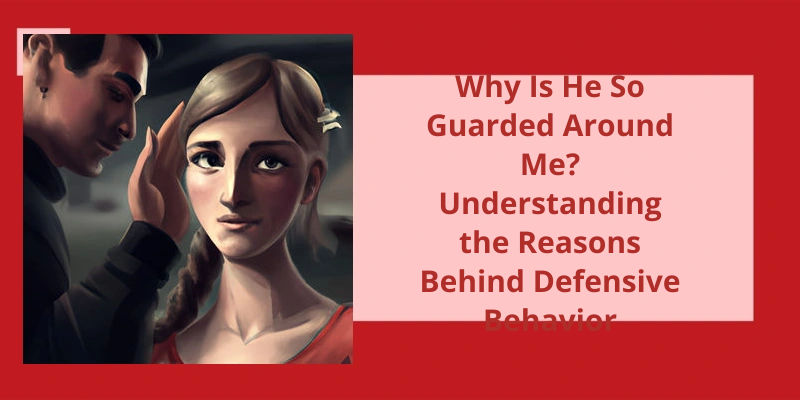There are many possible reasons as to why someone may be guarded around you. It could be that they’ve trust issues due to past experiences of betrayal or hurt. They may be unsure of your intentions or feelings towards them and are therefore cautious in their interactions with you. Some people are naturally more reserved and take time to open up to others. It’s important to consider the individual's personality and life experiences when attempting to understand their guarded behavior. It’s also important to approach the situation with empathy and understanding, rather than assuming negative intentions or motives. Building trust and creating a safe space for open communication may help to ease the person's guarded behavior over time.
When a Guy Lets His Guard Down Around You?
He trusts you enough to show you the real him, flaws and all. This is a sign that he values your opinion and feels safe enough to be vulnerable in your presence. When a guy lets his guard down around you, it shows that your relationship has reached a deeper level of intimacy and connection.
He may start opening up about his future plans and including you in them. He may also start showing physical affection and initiating more intimate conversations. If you feel the same way, it might be a good time to have a conversation about your feelings for each other and where you see the relationship going.
On the other hand, if youre not interested in pursuing a relationship with him, it’s important to let him down gently and with respect. Keep in mind that letting his guard down requires trust and vulnerability, so rejecting him can be a significant blow to his ego and self-esteem. Be kind and empathetic in your approach.
It can be a great foundation for a deeper and more meaningful connection. So, enjoy the relaxed moments and take the time to get to know each other on a more personal level. You never know where it might lead.
Signs That a Guy Is Hesitant to Let His Guard Down
Here are some signs that a guy might be hesitant to let his guard down:
– He avoids talking about personal details of his life
– He doesn’t open up about his feelings or emotions
– He keeps conversations light and avoids discussing deeper topics
– He maintains a certain level of distance or reserve in his interactions with others
– He may have a history of being hurt or betrayed, and is protective of himself as a result
Understanding the root causes of guarded behavior is crucial to breaking down emotional barriers and building stronger relationships. Whether it’s innate personality traits, early childhood experiences, or past hurts, identifying the source of guardedness can help bring about healing and growth in oneself and in relationships with others. In this article, we explore the underlying causes of guarded behavior and offer tips on how to navigate relationships with guarded individuals.
What Causes Someone to Be Very Guarded?
These past experiences can cause you to become more reserved and cautious in your interactions with others. It’s not uncommon to develop trust issues or fear of vulnerability as a result of past betrayals or heartbreaks. This guarded behavior is a defense mechanism to prevent further emotional pain and rejection.
Additionally, environmental factors can also contribute to guarded behavior. Someone who grew up in an unstable or abusive household may develop a guarded personality as a means of protecting themselves from future harm. They may have learned early on to keep certain thoughts and feelings to themselves, lest they incite anger or abuse from their caretakers.
Another factor that can contribute to guardedness is culture or societal norms. Certain cultures or communities may place a high value on privacy or keeping emotions hidden, which can lead to individuals becoming more guarded in their personal interactions. This can also be influenced by individual beliefs or values around vulnerability and strength.
It’s important to note that being guarded isn’t inherently negative, and can actually be a healthy coping mechanism for some individuals. However, it can also lead to difficulties in forming close relationships and cultivating intimacy. If guarded behavior is causing significant distress or hindering personal growth, it may be helpful to seek therapy or support to work through underlying emotional issues.
Source: The Guarded Personality and It’s 6 Hidden Powers
When a place or person is heavily guarded, it means they’re protected by a large group of individuals who’re armed and prepared to defend them against potential threats. This level of security is often used to protect high-profile individuals or important locations such as museums, government buildings, or prisons. Heavily guarded areas are intended to deter any potential threats and ensure the safety of those being protected. However, being heavily guarded can also create a sense of unease and intimidation for those attempting to access these locations.
What Does It Mean to Be Heavily Guarded?
When something is heavily guarded, it means that it’s protected by a strong and powerful force of people, often security personnel, who’re trained to prevent any unauthorized access or harm to the guarded item. The presence of guards, surveillance equipment, and other security measures can help to deter potential threats and keep the area secure. This could include anything from a high-security compound to a valuable object or individual, who may be the target of an attack or theft.
Those who’re responsible for protecting these areas must be highly trained and vigilant, constantly monitoring for potential threats and being prepared to respond quickly and effectively if necessary. This requires a great deal of skill, dedication, and expertise, which is why security personnel are often recruited from law enforcement or military backgrounds.
Conclusion
In conclusion, human behavior is a complex phenomenon that often defies explanation. It could be a result of past experiences or simply an innate tendency to be cautious around new acquaintances. Whatever the reason may be, the key is to approach the situation with empathy and understanding. Only then can we hope to break down the walls that may be preventing meaningful connection and understanding between individuals. Ultimately, the ability to be vulnerable and open with others is a crucial ingredient for building healthy relationships and communities, and it’s up to each of us to work towards achieving that goal.






